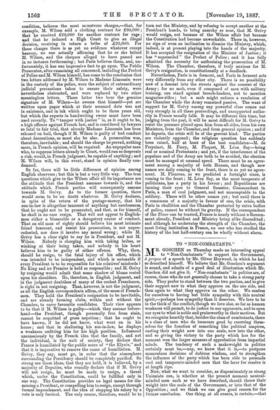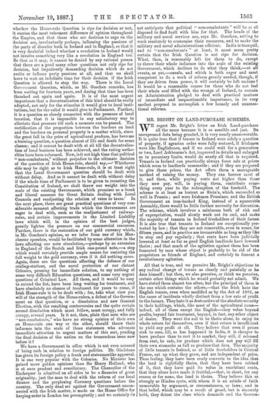TO "NON-COMBATANTS."
MR. GOSCHEN on Thursday made an interesting appeal to " Non-Combatants" to support the Government, a propos of a speech by Mr. Oliver Heywood, in which he had so described himself. We believe that Mr. Goschen's argument is sound, and admits of a good deal of illustration which Mr. Goschen did not give it. "Non-combatants " in politics are, of course, those who do not generally choose to take a strong party side. They prefer to stand between the two parties, and to give their support now to what they approve on the one side, and then again to what they approve on the other. We confess for ourselves to having but little sympathy with this neutral spirit,—perhaps less sympathy than it deserves. We love to be in the thick of the conflict, though we love also, so far as human weakness will permit, to do justice to our opponents, and to open Our eyes to what is noble and praiseworthy in their motives. But we recognise heartily that, besides the class of combatants, there is a class of men who do immense good by reserving them- selves for the function of something like political umpires, casting their weight now into one scale, now into the other, and so giving the victory to the party which has for the moment won the larger measure of approbation from impartial minds. The tendency of such a makeweight in politics certainly must be,—nay, we know that it is,—to postpone momentous decisions of dubious wisdom, and to strengthen the influence of the party which has been able to persuade cool and temperate-minded men that the hour for resolve is at length ripe.
Now, what we want to consider, as dispassionately as strong Unionists can, is whether at the present moment neutral- minded men such as we have described, should throw their weight into the scale of the Government, or into that of the Opposition ; and we think we can give good reason for the former conclusion. One thing, at all events, is certain,—that
whether the Home-rule Question is ripe for decision or not, it excites the most vehement difference of opinion throughout the Empire, and that those who are desirous to urge on the decision are, involuntarily perhaps, inflaming the passions of the party of disorder both in Ireland and in England, so that it is very doubtful indeed whether a revolution in Ireland would not involve something very like a revolution in England too.> Be that as it may, it cannot be denied by any rational person that there are a good many other questions not only ripe for decision, but impatiently demanding decision which do not excite or inflame party passions at all, and that we shall have to wait an indefinite time for their decision if the Irish Question is allowed to stop the way. There is the Local Government Question, which, as Mr. Goschen remarks, has been waiting for fourteen years, and during that time has been thrashed out again and again. It is of the most urgent importance that a decentralisation of this kind should be really adopted, not only for the stimulus it would give to local insti- tutions, but for the relief it would give to Parliament. Further, it is a question so closely connected with the pressure of local taxation, that it is impossible in any satisfactory way to alleviate that pressure till such a measure can be passed. The rectification of the proportion between the burdens on land and the burdens on personal property is a matter which, since the great fall in the price of agricultural produce, has beco me a burning question, a question almost of life and death for some classes; and it cannot be dealt with at all till the decentralisa- tion of local business has been achieved, and the rating autho- rities have been reformed. Now, is it not high time that political " non-combatants," without prejudice to the ultimate decision of the question of Irish Home-rule, should say,—' Whichever side may be right as to Irish Home-rule, it is at least right that the Local Government question should be dealt with without delay. And as it cannot be dealt with without delay if the whole time of Parliament is to be given to recasting the Constitution of Ireland, we shall throw our weight into the scale of the existing Government, which promises us a frank and liberal measure for Great Britain dealing with Local Councils and readjusting the relation of rates to taxes.' In the next place, there are great practical questions of very con- siderable moment affecting trade which the Government are eager to deal with, such as the readjustment of railway- rates, and certain improvements in the Limited Liability laws which will, in the opinion of the best judges, greatly lighten the pressure on our commercial resources. Further, there is the restoration of our gold currency which, in Mr. Goschen's opinion, as we infer from one of his Man- chester speeches, would be facilitated by some alteration in the laws affecting our note circulation,—perhaps by an extension to England of the Scotch and Irish one-pound note,—a step which would certainly provide ample means for restoring the full weight to the gold currency, even if it did nothing more. Again, there are the questions affecting the defence of our coaling-stations, and the naval protection of our distant Colonies, pressing for immediate solution, to say nothing of some very difficult Education questions, and some very urgent questions of Criminal Law. All these, and it would be easy to extend the list, have been long waiting for treatment, and have absolutely no chance of treatment for years to come, if Irish Home-rule is to be dealt with ; for, take what view you will of the strength of the Home-rulers, a defeat of the Govern- ment on that question, or a dissolution and new General Election, with the resulting controversies and the quite certain second dissolution which must follow, must occupy, and fully occupy, several years. Is it not, then, plain that men who are "non-combatants," who have no strong opinion of their own on Home-rule one way or the other, should throw their influence into the scale of those statesmen who advocate immediate attention to urgent matters of this sort, pending the final decision of the nation on the tremendous issue now before it I
We have a Government in office which is not even accused of being rash in relation to foreign politics. Mr. Gladstone has given its foreign policy a frank and statesmanlike approval. It is one very popular with the Colonies. No Minister has gained more golden opinions than Sir Henry Holland, who is at once prudent and conciliatory. The Chancellor of the Exchequer is admitted on all sides to be a financier of great originality, just the man to deal with the reform of our local finance and the perplexing Currency questions before the country. The only dead set against the Government uncon- nected with the Irish matter, is made on the Home Office for keeping order in London too peremptorily ; and we certainly do not anticipate that political " non-combatants " will be at all disposed to find fault with him for that. The heads of the military and naval services are, says Mr. Goschen, setting to work resolutely to economise their resources, and to make the military and naval administrations efficient. India is tranquil, and to "non-combatants " at least, it must seem pretty certain that the Irish Question is not ripe for decision. What, then, is reasonably left for them to do, except to throw their whole influence into the scale of the existing Government, which declines to do what they think,—at all events, as yet,—unsafe, and which is both eager and most competent to do a work of reform greatly needed, though, if they are driven from power, it will certainly be left undone I It would be a reasonable course for those who do not feel their whole soul filled with the wrongs of Ireland, to sustain an Administration pledged to deal with practical matters of immediate and unquestionable importance, in its very modest proposal to accomplish a few homely and unsensa- tional reforms.
























































 Previous page
Previous page